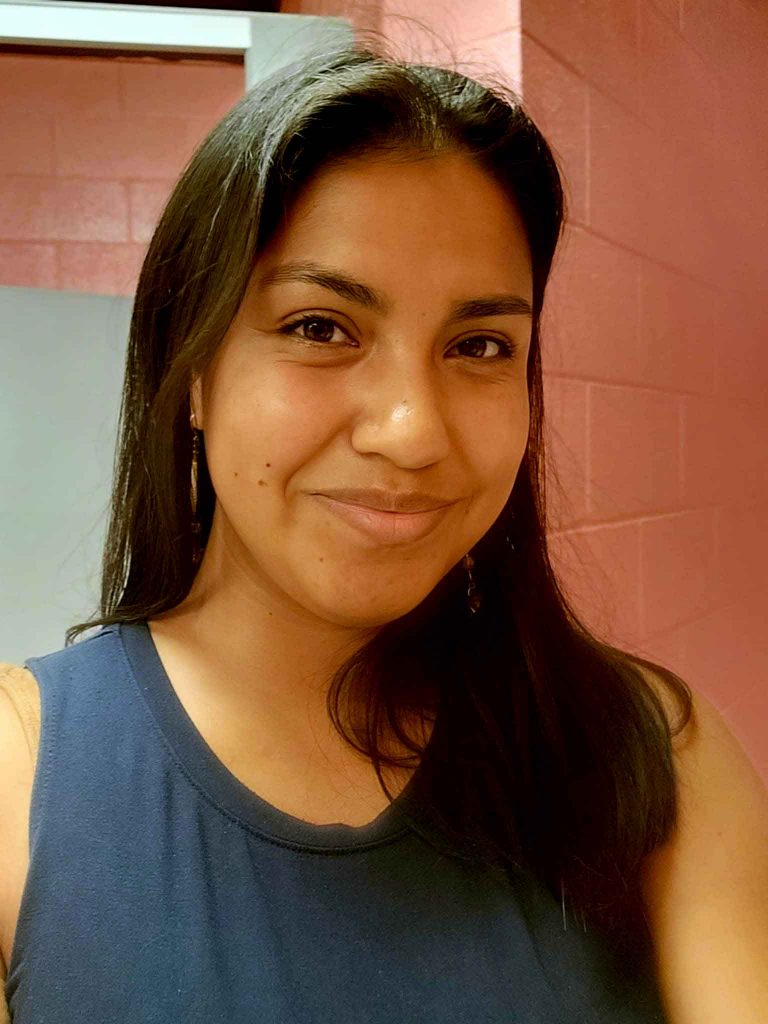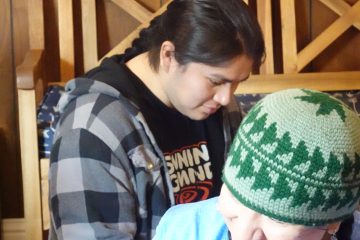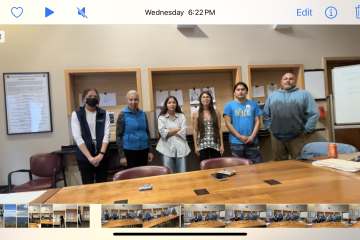Ayukîi Koovúra! Hello All!
Francisca (Frankie) Tripp was hired this past Winter (February) by the Karuk Tribe to coordinate tribal language activities. She is charged with the objectives to establish a pool of teachers who will teach the Karuk language in the local school districts, and to organize a strategic planning that will combine the input of tribal council, tribal program, and most importantly the Karuk community. She has been able to date to prepare and submit a major grant application, network the many groups involved in language, including schools, tribal education and other youth activities, and the provide the important link between the Karuk language community and the tribal council and administration.
She is the first tribal language coordinator since the early 2017. Tripp brings a strong work and cultural ethic to her job. She has been involved personally in language revitalization since grade school. She resides in the Karuk traditional homelands along the Klamath River in northwestern California and has 3 children.

Interview with Frankie Tripp
Julian: Shall we do a little mini-interview real quick?
Frankie: Sure.
JL: What is your vision for Karuk language revitalization?
FT: I want it (the Karuk language) to be normalized. For all Karuk children. To speak Karuk first. And that they will have environments that support them to do so. That’s it.
JL: We might want to know, How does the language enrich your life?
FT: A lot of my life is focused around my homeland and my children. And learning Karuk has given me a deeper understanding of places through placenames and plants, just more information, and then down to the way I talk to my children, to the way I talk to my family. Um. You know, there’s times [when you have to be] harsh and there’s time [when it] is not. There’s time where, “you are doing nothing?” Are you being lazy? We’re not going to call them lazy, you know, we are just going to say they aren’t doing anything.
And it just changes my frame of mind for a lot of things. Um. I tend to over complicate things, and Karuk reminds me to simplify.
JL: Nice.
Since you started in February what are some milestones, or a high point about what is going on.
FT: I think applying for the ANA (Administration of Native Americans) grant is the highest point so far,
JL: Due to the complexity of it? Or…
FT: (Nods her head in affirmation.) Yeah. It’s one of the biggest grants for language development that would allow us to lay a foundation to our program before [we go] after smaller grants that can be a little more focused. This one will be a foundational step.
Also another high point for me has been working with all of the people that I have admired growing up, like “Oh! They are a fluent speaker!”
Like Crystal (Richardson). Like Crystal has always been one of the coolest people. Or like Susan (Gehr). All my teachers that I thought were admirable [as I was] growing up. or like, ‘oh wait!’ Like you! [You] are passing the torch almost. Ok. Now you [the younger generation] do the work. We started the work. Now you have to continue it.
JL: That idea of being a part of a continuum.
FT: (Nods if affirmation.)
JL: Do you have any words of wisdom or inspiration that you want to share with people? I mean we have descendants, we have tribal members, people just discovering their identities.
FT: I would say there is no place too small to start. And to not feel intimidated by people who might know more than you. Because, every person that I have met. Every person that has been involved in language WANTS people to learn! Whether [it’s] a small amount, a large amount, everywhere in-between. They learned from those who came before them. And now all they want to do is pass that on, whether it’s a few words or a few phrases, or whole monologues.
JL: Yeah
FT: Ain’t no places too small to start!
JL: Yeah, cool. Vura yêeshiip!
END



0 Comments